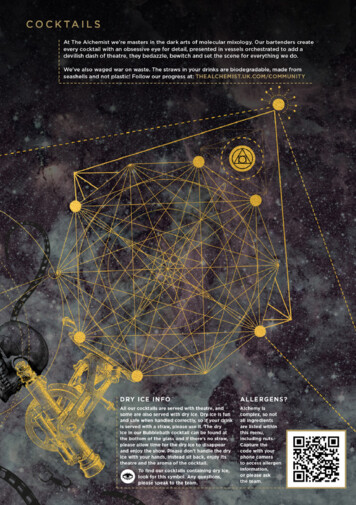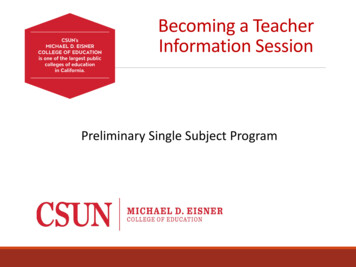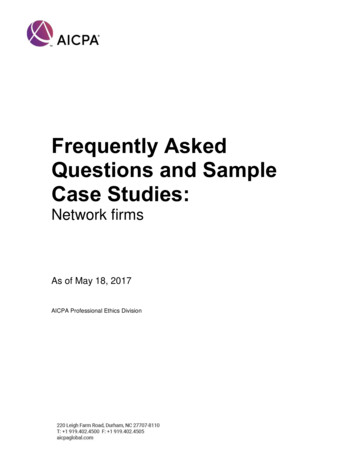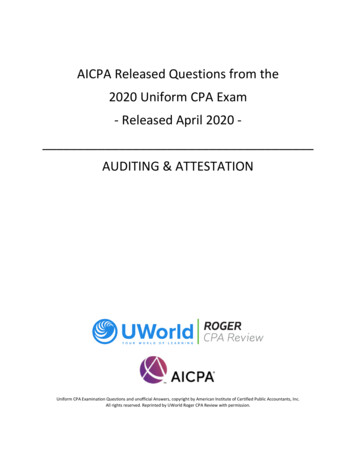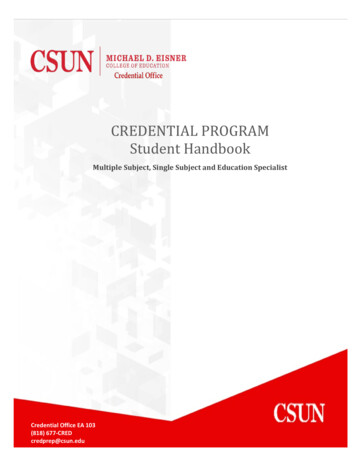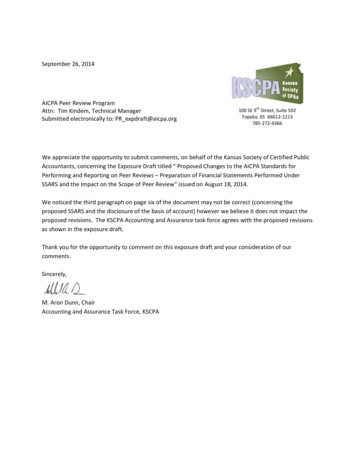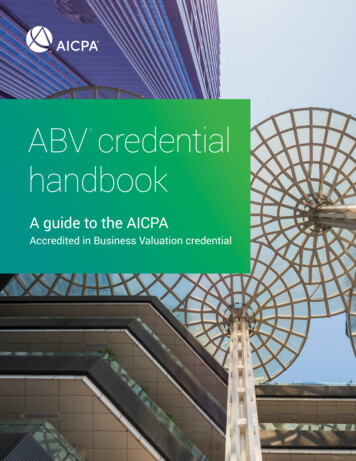
Transcription
ABV credentialhandbook A guide to the AICPAAccredited in Business Valuation credentiali ABV credential handbook - A guide to the AICPA Accredited in Business Valuation credential
Disclaimer: The contents of this publication do not necessarily reflect the position or opinion of the American Institute ofCPAs, its divisions and its committees. This publication is designed to provide accurate and authoritative information on thesubject covered. It is distributed with the understanding that the authors are not engaged in rendering legal, accounting orother professional services. If legal advice or other expert assistance is required, the services of a competent professionalshould be sought.For more information about the procedure for requesting permission to make copies of any part of this work, please emailcopyright@aicpa.org with your request. Otherwise, requests should be written and mailed to the Permissions Department,AICPA, 220 Leigh Farm Road, Durham, NC 27707–8110.ii ABV credential handbook - A guide to the AICPA Accredited in Business Valuation credential
Contents2Introduction3Objectives of the program9Exam reciprocity for ASA, CFA or CBVcandidates10 ABV credential application audit3How the ABV credential will enhanceyour career11 Receiving the ABV credential4Benefits of the ABV credential11 ABV credential recertification requirements4Benefits of FVS Section membership12 Additional information5ABV credential requirementsABV credential handbook — A guide to the AICPA Accredited in Business Valuation credential1
IntroductionThe American Institute of CPAs established the Accredited in Business Valuation(ABV ) credential program in 1998 for members who specialize in valuation. TheABV credential is granted exclusively by the AICPA to CPAs and qualified valuationprofessionals who demonstrate considerable expertise in valuation through theirknowledge, skill, experience and adherence to professional standards.This handbook provides information on how to obtain the ABV credential.ABV credential handbook — A guide to the AICPA Accredited in Business Valuation credential2
Objectives of theprogramThe objectives of the ABV credential program are to: Enhance the quality of valuation services ABVcredential holders provide Increase practice development and careeropportunities for ABV credential holders Promote members’ services through the Forensic andValuation Services (FVS) Section website Achieve public recognition of ABV credentialholders as the preferred valuation professionalHow the ABVcredential will enhanceyour careerCPAs and qualified valuation professionals who providevaluation services obtain the ABV credential because it: Positions the credential holder as a premier valuationservices provider Enhances the practitioner’s reputation as a competent,trustworthy valuation expert Promotes a greater level of confidence for current andpotential clients Demonstrates commitment to continuously improvingvaluation skills and expertise, resulting in increasedprofessional competency Offers opportunity to deepen client relationships —valuation consistently has been in the top growing serviceareas in Accounting Today’s profile of Top 100 Firms E xpands opportunities for referrals from otherpractitioners, strategic partners, attorneysand clients Includes you in a community of valuation professionalswith similar interests and practices Distinguishes your practice with the powerful combinationof the AICPA brand and the ABV credentialABV credential handbook — A guide to the AICPA Accredited in Business Valuation credential3
Benefits of the ABVcredentialBenefits of FVSSection membership Advocacy — Support regarding federal and internationalregulatory issues that impact professionals whospecialize in forensic and valuation services Practice aids and other non-authoritative guidance —Guidance on forensic- and valuation-related technicalissues, such as valuations for estate and gift tax,intellectual property, mergers and acquisitions disputes,economic damages and litigation support services Marketing assistance — Creative ideas for marketingand managing an FVS practice ABV Marketing Toolkit — Designed to help ABVcredential holders market their skills and build theirvaluation practices Webcasts — Topics include forensic- and valuationrelated technical issues, as well as hot topics that affectniche practices. Public Awareness Program — The AICPA’s ongoingmedia relations campaign heightens the awarenessof the ABV credential among clients, the business andlegal communities and various media outlets Conference discounts — Discounted rates at the AICPAFVS educational conferences, such as the AnnualAICPA Forensic and Valuation Services Conference,the AICPA Business Valuation School, the AICPA FairValue Measurements Workshop and the AICPA ExpertWitness Skills Workshop Recognition at the AICPA Forensic and ValuationServices Conference – Networking opportunities withother ABV credential holders Find an ABV — An online directory of all ABV credentialholders, which is also available to the public Professional discounts — ABV credential holdersbenefit from vendor discounts and special offerson selected products and publications used in theirvaluation practices AICPA offers ABV credential holders automaticFVS Section membership Exclusive FVS website content — Access to articles,case studies, checklists, worksheets and tools Professional resource discounts — FVS membersbenefit from vendor discounts and special offerson selected products and publications Regulatory insight — Timely information on this field’scomplex laws and regulations Networking opportunities — Invaluable opportunitiesto collaborate and share best practices throughparticipation in the Conference Town Hall Sessions, ABVand CFF Champion Programs, AICPA FVS SectionMember LinkedIn Subgroup and moreABV credential handbook — A guide to the AICPA Accredited in Business Valuation credential4
ABV credential requirementsFor CPAs1. Maintain Regular, Honorary or International AssociateAICPA Membership in good standing.2. Hold a valid and unrevoked CPA license or certificateissued by a legally constituted state authority.3. Pass the ABV Examination (requirement waived forcandidates who have passed the ASA credential examof the American Society of Appraisers, CFA examlevel III of the CFA Institute or CBV credential exam ofthe Canadian Institute of Chartered Business Valuators).4. Upon successfully passing the ABV Exam, completethe ABV Credential Application online. Applicants mustattest to meeting the minimum Business Experienceand Education requirements and pay the appropriatecredential fee.5. Business Experience: CPA candidates must haveobtained a minimum of 1,500 hours of valuation-relatedexperience within the 5-year period preceding the dateof the credential application. See below for examplesof business experience.6. Education Requirement: All candidates must complete75 hours of valuation-related continuing professionaldevelopment (CPD) within the 5-year period precedingthe date of the credential application. See below forfurther details.7. Sign a Declaration of Intent to comply with therequirements of ABV Recertification.4. Pass the ABV Examination (requirement waived forcandidates who have passed the ASA credential examof the American Society of Appraisers, CFA examlevel III of the CFA Institute or CBV credential exam ofthe Canadian Institute of Chartered Business Valuators).5. Upon successfully passing the ABV Exam, completethe ABV Credential Application online. Applicants mustattest to meeting the minimum Business Experienceand Education requirements pay the appropriatecredential fee.6. Business experience — Valuation professionalcandidates must obtain a minimum of 4,500 hours ofvaluation-related experience within the five-year periodpreceding the date of the credential application. Seebelow for examples of business experience.7. Education requirement — All candidates must complete75 hours of valuation-related continuing professionaldevelopment (CPD) within the 5-year period precedingthe date of the credential application. See below forfurther details.8. Sign a Declaration of Intent to comply with therequirements of ABV Recertification.The examination requirementThere are two ways to satisfy the examinationrequirement:1. Pass the two-part, six-hour ABV Examination.For valuation professionals1. Maintain Associate, Non-CPA Associate or CPA ExamCandidate Affiliate AICPA Membership in goodstanding.2. Hold a bachelor’s degree or equivalent from anaccredited college or university.3. Complete required training on the AICPA Code ofProfessional Conduct or the AICPA ProfessionalConduct and Standards Education for FinanceProfessionals course.2. Pass the ASA credential exam of the American Societyof Appraisers, CFA exam level III of the CFA Instituteor CBV credential exam of the Canadian Institute ofChartered Business Valuators.For more information about the AICPA’s ABV Examination,including exam fees, the registration and schedulingprocess, the Content Specification Outline (CSO), exampreparation and receiving exam results, please visitaicpa.org/abvexam.ABV credential handbook — A guide to the AICPA Accredited in Business Valuation credential5
ABV credential requirements (continued)The business experience requirementCPA candidates will successfully complete theexperience requirement by obtaining at least 1,500 hoursof valuation-related experience. Valuation professionalcandidates will successfully complete the experiencerequirement by obtaining at least 4,500 hours ofvaluation related experience. This experience must havebeen obtained within the five-year period preceding thedate of the credential application.Experience must be related to the application of the topicscovered on the ABV Exam Content Specification Outlineduring the valuation of a business, business ownershipinterest, security or intangible asset. Experience mayinclude performing, mentoring, supervising or managingvaluation engagements; reviews of valuations prepared bya third party; signing valuation reports; or consulting on,instructing, authoring or developing thought leadershipand staff development on valuation matters.Additionally, while gaining experience to meet the ABVcredential requirements, all candidates must exhibitprofessional competence as noted in Paragraph 11 of VSSection 100, Valuation of a Business, Business OwnershipInterest, Security, or Intangible Asset. This paragraphreads as follows:The “General Standards Rule” of the code (ETsec. 1.300.001 and 2.300.001) states that a membershall “undertake only those professional services thatthe member or the member’s firm can reasonablyexpect to be completed with professional competence.”Performing a valuation engagement with professionalcompetence involves special knowledge and skill. Avaluation analyst should possess a level of knowledge ofvaluation principles and theory and a level of skill in theapplication of such principles that will enable him or herto identify, gather, and analyze data, consider and applyappropriate valuation approaches and methods, anduse professional judgment in developing the estimate ofvalue (whether a single amount or a range). An in-depthdiscussion of valuation theory and principles, and howand when to apply them, is not within the scope of thisstatement.Examples of this type of experience include, but are notlimited to: Employees in or proprietors of a public accounting firm Employees of a consulting firm that is not a publicaccounting firm Auditors for fair value for financial reporting: Auditorscompleting reviews of fair value for purposes of financialreporting whereby the auditor performs tasks consistingof recalculation of the discount rates, capitalizationrates, and verifying models on calculations of valueusing professional judgment Employees working in a private equity group, investmentbank or venture capital firm Employees working in a company’s corporatedevelopment (i.e., mergers and acquisitions) department Employees performing analytical work in any merger,acquisition or deal-making setting Employees working for a research or publishing entityperforming merger, acquisition or similar workAdditional business valuation related experience andeducation topics:Experience gained for the purposes of meeting the ABVcredential requirements can be obtained through a varietyof engagements or work responsibilities. They include, butare not limited to: Mergers and acquisitions, spin-offs and liquidations Reorganizations and bankruptcies Initial public offerings (IPOs) Damages litigation and ownership disputes Fairness opinions Estate, gift and income tax Ad valorem taxes Insurance claims Marital dissolution Dissenter’s rights Eminent domain actions Shareholder oppression casesABV credential handbook — A guide to the AICPA Accredited in Business Valuation credential6
Employee Stock Ownership Plans (ESOPs) Financial reporting Charitable contributions Allocation of purchase price Goodwill impairment Buy/sell agreements Family limited partnerships Recapitalizations Financing Business planning Stock option plans Compensation1The education requirementAn ABV candidate must have a minimum of 75hours of valuation-related continuing professionaldevelopment (CPD). All hours must have been obtainedwithin the five-year period preceding the date of thecredential application.The education requirement is designed to maintainyour competency by requiring timely updates ofexisting valuation knowledge and skills, and to provide amechanism for monitoring your competency-maintenanceefforts.CPAs are responsible for complying with all applicableCPE requirements, rules and regulations of state boardsof accountancy, as well as those of membershipassociations and other professional organizations. Visitaicpa.org/cpe to become familiar with the CPE Standardsissued by AICPA and NASBA, learn the CPE continuingprofessional development requirements for AICPA members, and find out the specific CPE requirements for eachstate board and society. The following categories of education are eligible: CPEwill be given for formal educational programs oflearning in self-study or group-study format on topicsrelevant to the ABV body of knowledge Approvedcourses at an accredited university or college— For university or college courses taken in topicsrelevant to the ABV body of knowledge1 Presenting continuing education courses — Instructorsreceive credit for the preparation and presentation ofCPE courses and technical papers on topics relevant tothe ABV body of knowledge Authoring — Articles and publications in topics related tothe ABV body of knowledge Unstructured learning — May include activities such ascoaching, mentoring, peer-to-peer learning, and on-thejob training; these expanded opportunities allow youto develop professional competencies necessary tosupport continued success in your area of specializationFor a listing of the applicable ABV knowledge and skillsused to meet the educational requirements, see theexamples of methods used in valuation engagementslisted below or the ABV Exam Content SpecificationOutline.Examples of methods used on such engagements include,but are not limited to: Cash flow valuation — Analyze the historicalperformance of the business; estimate the cost ofcapital; calculate the value of the cash flow stream; andinterpret the results Specialized valuation skills and training — Securitymarket options; research techniques and research tools;company, industry and economic data analysis; valuationcalculations and conclusions; engagement reporting;and Code of Professional Conduct and ProfessionalStandards Analysis of financial information — Linkage betweenpurpose for the valuation, standard of value andownership; and sources and uses of industry financialand operating data Financial forecasting — Statistical techniques: simpleand multiple regressions; time series analysis; AICPAProspective Financial Reporting Guidelines; determiningand documenting significant forecast assumptions;company and industry data; and sources and uses ofeconomic data ist of valuation areas obtained from Understanding Business Valuation, Gary Trugman, 5th edition, 2017 pg. 3Land Financial Valuation: Applications and Models, James Hitchner, 4rd edition, 2017, pg. 2.ABV credential handbook — A guide to the AICPA Accredited in Business Valuation credential7
ABV credential requirements (continued) E stimating cost of capital (discount and capitalizationrates) — Understanding the sources and limitations ofdata; security market line; market efficiency, theoreticalunderpinning of discount and capitalization rates —capital asset pricing model, multi-factor models,difference and similarities of CAPM and the build-upmethod; sources of small-firm risk premiums,firm-specific risk premium and other adjustments tocost of capital (when and how); Beta — understandingthe sources and calculations, R-squared and otherpotential limitations; estimating Beta for privately ownedcompanies, including guideline companies’ levered Beta(bL) and Guideline Companies’ Proxy unlevered Beta (bu) Selecting and evaluating guideline company data— Screening and selection process; goodness of fitissues; guideline companies; data to use and the properuse of the data; linkages between the Standard ofValue, purpose for the valuation, selection of guidelinecompanies and specific data; court cases involvingacceptance and rejection of guideline company data Entity and specialized industry issues — ESOP plans;Family Limited Partnerships; medical practices;professional service business, other service businesses;start-up, research and development, or technologybased businesses; initial public offering (IPO) candidates;merger and acquisition valuation engagements; realestate or other holding companies; and specializedindustries (construction, retail, restaurants, etc.) Report preparation and engagement administration —Awareness of appropriate VS Section 100 reportingstandards; proper documentation of research;presentation of and support for the valuation conclusion;sufficient and competent evidential matter; guidelines forwork paper and supporting documentation; andengagement letters and letters of representation Litigation dispute resolution services — Rules ofevidence; qualifications of experts; roles of the consultingexpert and the testifying expert; and depositions andcourt testimony Determining the proper valuation discounts or premiums— Reasons for discounts and premiums such asmarketability and control issues; Standard of Value,purpose for the valuation, ownership issues and theproper usage of discounts; sources for estimatingdiscounts such as identifying and understanding theempirical research of liquidity and control issues; andmethods used to select and apply proper discountsand premiums Linkages between approaches, standards of value —Purpose of Valuation and Discounts Income methods;market methods; asset-based methods; liquidity andmarketability issues; control and minority ownershippositions; fair market value, investment value andfair valueABV credential handbook — A guide to the AICPA Accredited in Business Valuation credential8
Additional requirements for qualified valuationprofessionalsQualified valuation professionals must hold a bachelor’sdegree or equivalent from an accredited college oruniversity and complete required training on the AICPACode of Professional Conduct or the AICPA ProfessionalConduct and Standards Education for FinanceProfessionals course. The AICPA Professional Conductand Standards Education for Finance Professionals isavailable on the AICPA Store as a stand-alone product oras part of the Certified in Entity and Intangibles (CEIV )credential education bundle. Candidates who hold theCEIV credential or plan to obtain the CEIV credential maynot want to purchase this course in addition to the CEIVcredential education bundle.Exam reciprocity forASA, CFA or CBVcredential candidatesThe ABV Exam requirement is waived for candidates whohave passed the ASA credential exam of the AmericanSociety of Appraisers, CFA exam level III of the CFAInstitute or CBV credential exam of the Canadian Instituteof Chartered Business Valuators. All other requirementsmust be met before applying online.ABV credential handbook — A guide to the AICPA Accredited in Business Valuation credential9
ABV credentialapplication auditA sample of accepted applications are selected fora random audit. Any misrepresentations or incorrectinformation provided to the AICPA can result indisciplinary action, including suspension or revocationof eligibility and/or credential. In the event of anaudit, documentation of third-party exams, businessexperience and education will be required as follows:Third-party examsIf the ABV Exam was waived because you passed theASA, CFA or CBV exam, you must provide documentationfrom the third-party institution on official letterheadverifying your exam results. For authoring– Title of work– Related body of knowledge subject matter– Name of publisher– Type of publication– Date published– Number of hours to prepare For unstructured learning– Date(s) of activities– Format and length of activity– How the activity supports your continueddevelopmentBusiness experienceName of employer, dates of employment and arepresentation from employer/firm/supervisor stating youhave sufficiently completed the experience requirementsfor the ABV credential or a listing of applicableengagements on employer/firm letterhead or billingstatement including:– Dates of engagement– Role in the engagement– Type of industry– Type of entityEducation For CPE, approved courses at a university, othercontinuing professional development and tradeassociation conferences– Title of course/session– Related body of knowledge subject matter– Sponsor of course– Name of college/university– Format of course– Date(s)– Number of CPE credits, hours attended, semestercredits, etc.ABV credential handbook — A guide to the AICPA Accredited in Business Valuation credential 10
Receiving the ABVcredentialAfter receiving notification of successfully passing theexam and meeting all other requirements, apply forthe ABV credential using the online application ataicpa.org/abv. Once documentation and payment hasbeen submitted and approved by the AICPA, the candidatewill be notified. At that time, the candidate will be eligibleto use the ABV credential in compliance with the rules ofthe AICPA and of the state board(s) of accountancy for thestate(s) in which he or she practices, if applicable.The candidate is not authorized to use the credentialuntil he or she receives this notice.ABV credentialrecertificationrequirementsTo maintain the credential, ABV credential holders mustcontinue to pay the appropriate annual credential fee andmeet the following recertification requirements:1. Maintain AICPA membership in good standing.2. Complete 4 hours of professional ethics education every3 years.3. C omplete 60 hours of continuing professionaldevelopment (CPD) within the credential body ofknowledge every 3 years, with a minimum of 10 hoursannually. CPD may include: Structured learning activities approved by NASBA,a legally constituted state authority or otherprofessional body; or Unstructured learning activities, which may constituteup to 50% (30 hours every 3 years) of a credentialholder’s CPD to meet credential renewal requirements.4. When selected for audit, you will be notified in writingand receive details for reporting your recertificationrelated learning activities.ABV credential handbook — A guide to the AICPA Accredited in Business Valuation credential 11
ABV Member Service at 888.777.7077(M–F 9am–6pm ET)Write: AICPA ABV credentialAmerican Institute of CPAs220 Leigh Farm RoadDurham, NC 27707ATTN: Member ServiceEmail: ABV@aicpa.orgVisit: aicpa.org/abvABV credential handbook — A guide to the AICPA Accredited in Business Valuation credential 12
P: 888.777.7077 F: 800.362.5066 W: aicpa.org/abv 2021 Association of International Certified Professional Accountants. All rights reserved. AICPA and American Institute of CPAs are trademarks of the American Institute of Certified PublicAccountants and are registered in the US, the EU and other countries. The Globe Design is a trademark owned by the Association of International Certified Professional Accountants and licensedo the AICPA. 2101-2824813 ABV credential handbook - A guide to the AICPA Accredited in Business Valuation credential
9 Exam reciprocity for ASA, CFA or CBV candidates 10 ABV credential application audit 11 Receiving the ABV credential 11 ABV credential recertification requirements 12 Additional information Contents . ABV credential handboo A guide to the AICPA Accredited in Business Valuation credential 2
